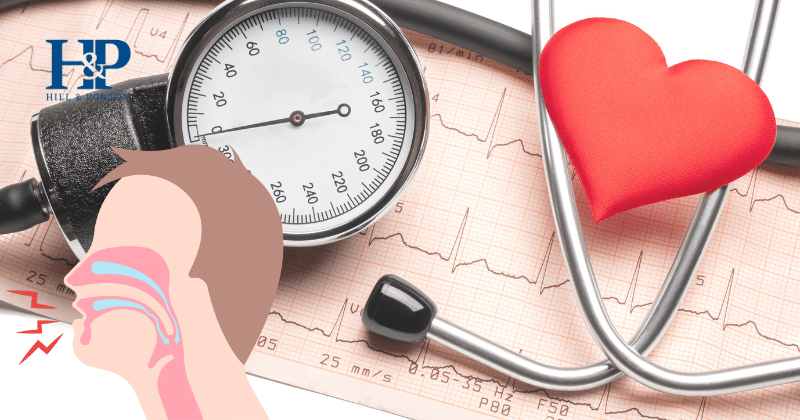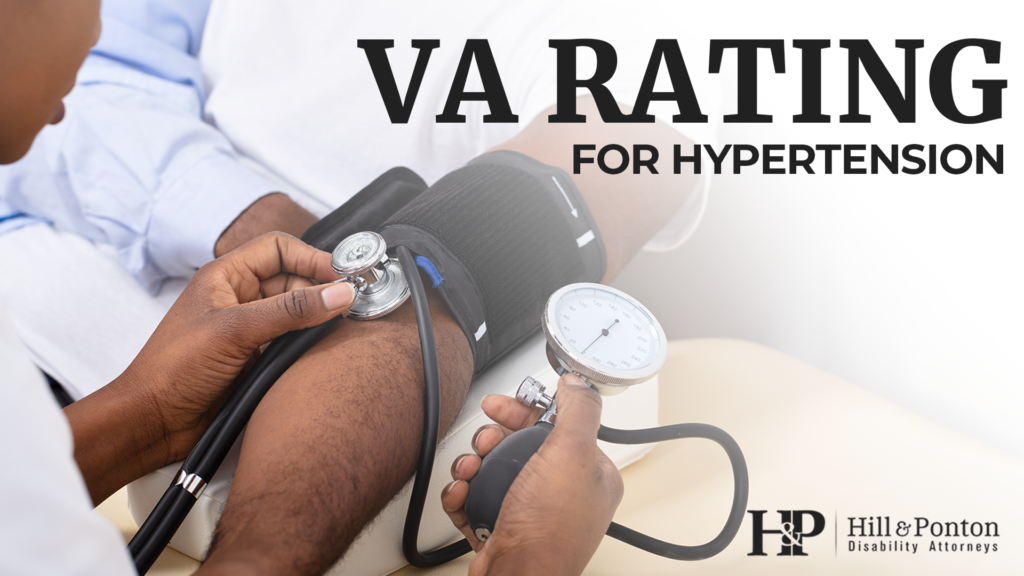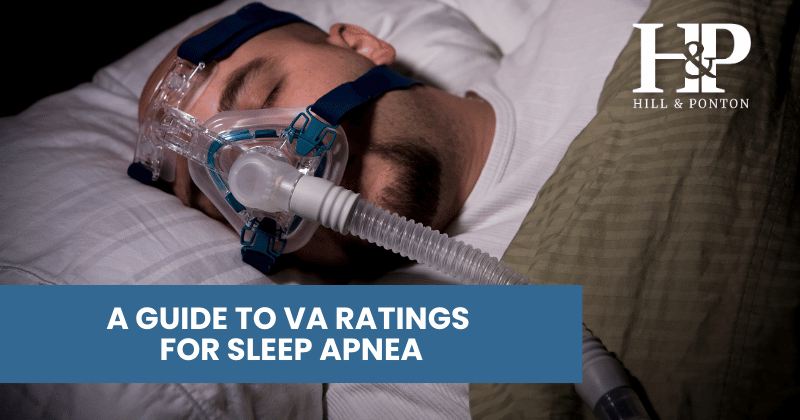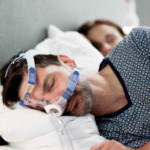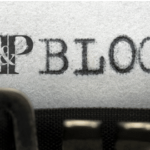If you’re a veteran reading this, chances are, you’ve already received a VA rating for sleep apnea.
Most likely, it’s at 50%, which is the average rating for veterans.
But, like many veterans, you’re exploring how to elevate that rating to 100% for optimal VA disability benefits!
Understandably, the complexities surrounding sleep apnea, especially obstructive sleep apnea and its connection to hypertension, are not always straightforward.
This post will delve into the critical nuances between sleep, apnea, and how they interlink with blood pressure.
The intention is to guide you through the maze of medical jargon like “central sleep apnea,” “positive airway pressure,” and “hypertension secondary to OSA severity.”
We’ll explore the role of sleep studies, the implications of high blood pressure on sleep disorder symptoms, and the relation between obstructive sleep apnea and your overall health, including potential risks like heart disease.
As veterans, your unique set of challenges and experiences, especially those from your military service, can exacerbate the severity of sleep disorders.
Let’s embark on this journey together, ensuring you’re armed with all the necessary information to help make the best decisions regarding your disability status and overall well-being.
Understanding Hypertension: A Quick Overview
Hypertension, commonly referred to as high blood pressure, is a condition many veterans grapple with.
But what does it mean, especially in the context of sleep apnea?
Blood Pressure Basics
Blood pressure is the force exerted by the blood against the walls of our arteries as the heart pumps it around the body.
Two numbers represent it: systolic (the higher number) and diastolic pressure (the lower number).
An elevation in either can be a cause for concern.
Hypertension and Veterans
Research has indicated that veterans are at a higher risk for hypertension, especially those with obstructive sleep apnea.
There’s a concerning relationship between sleep deprivation, which is common in those with any form of sleep disorder, and the rise in blood pressure.
This connection further intensifies when considering the additional stresses military service might have imposed, such as traumatic brain injury.
Interested in filing for hypertension secondary to sleep apnea but have been denied? Contact us today!
The Link with Sleep Apnea
The interplay between sleep and hypertension is critical.
OSA patients often experience episodes where breathing momentarily stops, leading to decreased oxygen saturation.
These disruptions can lead to increases in blood pressure.
Furthermore, hypertension secondary to OSA severity can lead to complications such as heart disease and pulmonary hypertension.
In veterans with a history of obstructive sleep apnea, these episodes of halted breathing, combined with high blood pressure, can be particularly dangerous.
Why It Matters
For veterans aiming to adjust their VA rating, it’s essential to understand the relation between sleep apnea and hypertension.
Especially since continuous positive airway pressure (CPAP) treatment, a common solution for sleep apnea, not only assists with breathing but can also have implications on blood pressure regulation.
Recognizing and managing hypertension is not only vital for your VA disability compensation but also crucial for overall health and longevity.
Want to learn more about hypertension? Check out our post below.
The Relationship Between Sleep Apnea and Hypertension
Sleep apnea and hypertension are two health conditions that are intricately linked, especially among veterans.
Let’s delve into this connection to gain a better understanding of its implications.
The Sleep Disruption Cycle
Sleep apnea, particularly obstructive sleep apnea (OSA), is characterized by repeated interruptions in breathing during sleep.
These interruptions, often due to a temporary blockage of the airway, can lead to short drops in blood oxygen levels.
As a result, this can trigger a stress response in the body, causing the release of certain chemicals that raise blood pressure.
Impact on Blood Vessels and Heart
With time, untreated sleep apnea can lead to persistent hypertension.
This high blood pressure affects the heart and blood vessels, increasing the risk for heart disease.
Continuous positive airway pressure (CPAP) treatment, frequently prescribed for those with severe OSA, helps regulate breathing.
This, in turn, can aid in controlling blood pressure levels.
Veterans and the Vicious Cycle
For veterans, this relationship is even more pronounced.
The stresses from military service, potential traumatic brain injuries, and other service-related health issues can further complicate the dynamics of sleep and hypertension.
Veterans with sleep disorders, such as sleep apnea, often grapple with exacerbated hypertension secondary to their apnea episodes.
This makes identifying and treating both conditions paramount.
A Two-Way Street
Interestingly, while sleep apnea can lead to hypertension, the reverse is also possible.
Individuals with high blood pressure can develop sleep disorders, emphasizing the intricate bond between sleep and blood pressure.
Furthermore, excessive daytime sleepiness, a symptom often reported by OSA patients, can be both a result of sleep deprivation and an indicator of heightened blood pressure.
The interrelationship between sleep apnea and hypertension is not just a medical concern—it’s a quality of life issue, especially for veterans.
Understanding this relationship is vital for those wanting to reassess their VA disability rating.
More importantly, managing these conditions can lead to improved overall health, ensuring that veterans lead longer, healthier lives.
Want to learn more about sleep apnea? Check out our guide below.
A Guide to VA Ratings for Sleep Apnea
Why is Hypertension Linked to Sleep Apnea?
Understanding the intricate link between hypertension and sleep apnea requires an exploration of the physiological effects that sleep disturbances impose on the cardiovascular system.
Both conditions, prevalent among veterans, are more than coincidentally related; they influence and magnify each other’s severity.
Oxygen Levels and Blood Pressure Regulation
The hallmark of sleep apnea, especially obstructive sleep apnea, is the periodic cessation of breathing.
These episodes result in reduced oxygen saturation in the blood. The body responds to these low oxygen levels by releasing stress hormones.
These hormones narrow the blood vessels, causing an immediate spike in blood pressure, thus connecting breathing disruptions directly to hypertension.
Sleep Quality and Heart Stress
Regular interruptions in sleep, as seen in sleep apnea patients, deprive the heart of its usual rest period.
The heart typically experiences a lower blood pressure during REM sleep.
But with recurrent awakenings and disrupted REM sleep cycles, this restful phase is compromised, causing prolonged periods of high blood pressure.
Such persistent hypertension can, over time, strain the heart and blood vessels.
Overactivity of the Nervous System
Sleep apnea can stimulate the sympathetic nervous system, the part responsible for our ‘fight or flight’ response.
This overstimulation results in increased heart rate and constriction of blood vessels, both of which elevate blood pressure.
For veterans, who might already have an activated nervous system due to the stresses of military service or traumatic brain injury, the impact of sleep apnea on hypertension can be even more pronounced.
Fluid Build-up in the Neck Region
In some cases, lying down can cause fluid to accumulate in the neck.
For individuals with sleep apnea, this build-up can further obstruct the airway, exacerbating apnea episodes.
This fluid can also press on blood vessels, contributing to elevated blood diastolic pressure.
Endothelial Dysfunction
Chronic episodes of low oxygen levels can lead to dysfunction in the endothelium, the inner lining of blood vessels.
When this lining doesn’t function correctly, it can cause or worsen hypertension.
Continuous positive airway pressure (CPAP) treatments, a common remedy for sleep apnea syndrome, have been shown to improve endothelial function, reinforcing the link between the two conditions.
The physiological responses to sleep disturbances, such as those caused by sleep apnea, play a critical role in the development and exacerbation of hypertension.
For veterans aiming to re-evaluate their VA disability benefits or simply seeking to understand their health better, recognizing this connection is paramount.
Can Hypertension Be Service Connected Secondary to Sleep Apnea?
For many veterans, understanding the interplay between sleep apnea and hypertension goes beyond mere health implications; it bears weight on their disability compensation as well.
The question of whether hypertension can be considered a secondary condition due to service-connected sleep apnea is vital.
The VA’s Stance on Secondary Conditions
Veterans Affairs (VA) recognizes that some conditions can arise as a direct result of a service-connected disability.
If you, as a veteran, can prove that your hypertension is a result of your service-connected sleep apnea, then the VA may grant you a secondary disability rating for the high blood pressure
Possible Barriers to Recognition
While the scientific and medical communities acknowledge the link between sleep apnea and hypertension, the VA may require explicit, well-documented evidence to recognize hypertension as secondary to sleep apnea.
Factors like age, other underlying conditions, and lifestyle habits (like diet and exercise) might be considered when evaluating the primary cause of hypertension.
Hypertension can indeed be service-connected secondary to sleep apnea.
However, it’s imperative to provide comprehensive evidence, medical records, and expert opinions to secure VA disability compensation related to these intertwined conditions.
For veterans who believe their high blood pressure is linked to their service-connected sleep apnea, seeking assistance and guidance in building a robust case can be invaluable.
Proving Hypertension Secondary to Sleep Apnea
When it comes to VA benefits and disability compensation, presenting a cogent argument based on evidence is fundamental.
For veterans aiming to demonstrate that their hypertension is secondary to sleep apnea, several steps are crucial.
Medical Documentation
Your journey begins with collecting pertinent medical records.
Regular monitoring and documentation of blood pressure levels, findings from sleep studies, and records of any continuous positive airway pressure (CPAP) treatment or other breathing assistance devices can be pivotal.
Want to learn more about the importance of evidence for your claims? Check out our guide below!
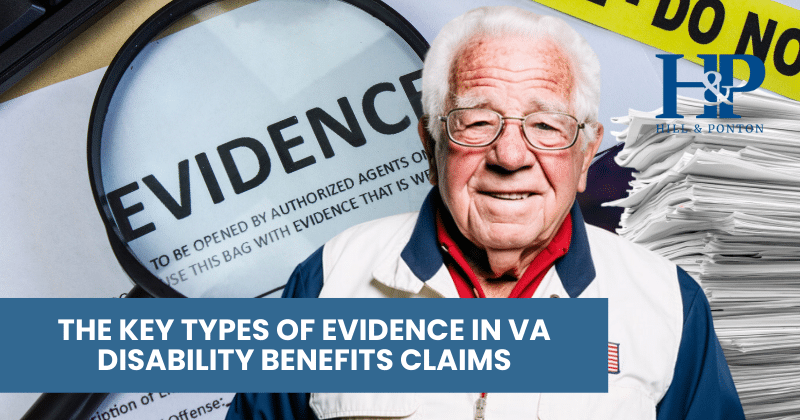
The Key Types of Evidence in VA Disability Benefits Claims
Expert Testimony
Collaborate with specialists in the fields of sleep medicine and cardiovascular health.
Their written statements, detailing how your sleep apnea directly influences your hypertension, can provide compelling support.
This is where the insight of a medical expert becomes invaluable.
Want to learn how to get a well-crafted nexus letter for your claim? Check out our blog post!

The Key to a Winning Nexus Letter
Consistent Monitoring
Maintaining a record of consistent use of devices like CPAP for obstructive sleep apnea and its impact on blood pressure can present a clear correlation.
Additionally, noting episodes of excessive daytime sleepiness, issues with REM sleep, or other sleep disorder symptoms can strengthen your case.
Secondary Evaluations
Consider undergoing evaluations that specifically look into the relationship between sleep apnea and hypertension.
OSA severity, as determined by metrics like apnea-hypopnea index (AHI) and its correlation to diastolic and systolic pressure, can be enlightening.
Personal Statements
First-hand accounts from veterans and their close ones can underscore the daily challenges faced due to the intertwined conditions of sleep apnea and hypertension.
This personal touch, when coupled with medical data, can provide a holistic view of the veteran’s situation.
In conclusion, sleep apnea and its potential link to hypertension is not only a medical concern but a significant consideration for veterans seeking rightful disability compensation.
While the journey to securing a VA disability rating might be intricate, understanding the connection between these conditions and arming oneself with comprehensive evidence is the key.
Learn more about lay statements in our blog post below!
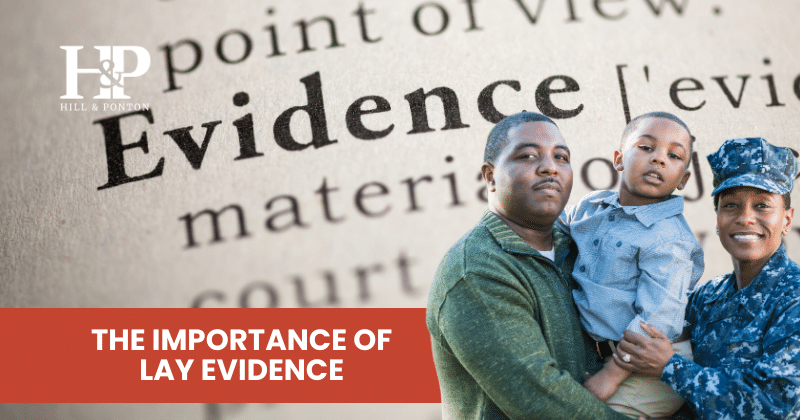
The Importance of Lay Evidence
Have Questions About Understanding How the Claims Process Works?
Hill & Ponton are here to support you with getting started with your claim.
If you are intending to appeal a denied claim, you can contact us for an evaluation and we can help you with this process.
However, if you are considering filing an initial claim, or even if you are interested in learning about the appeals process, we offer a free ebook to get you started on the right foot!
The Road to VA Compensation Benefits will help break down the claims process from start to finish. Click the link below to learn more.
